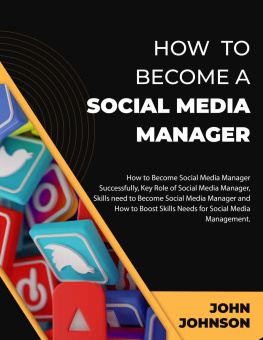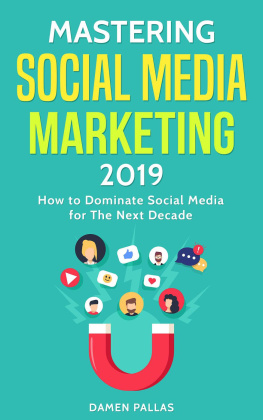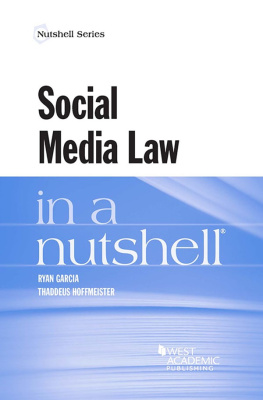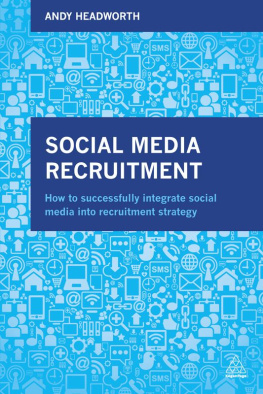HOW TO BECOME A SOCIAL MEDIA MANAGER
How to Become Social Media Manager Successfully, Key Role of Social Media Manager, Skills need to Become Social Media Manager and How to Boost Skills Needs for Social Media Management.
JOHN JOHNSON
Copyright 2021 by (John Johnson) - All rights reserved.
This document is geared towards providing exact and reliable information in regards to the topic and issue covered. The publication is sold with the idea that the publisher is not required to render accounting, officially permitted, or otherwise, qualified services. If advice is necessary, legal or professional, a practiced individual in the profession should be ordered from a Declaration of Principles, which was accepted and approved equally by a Committee of the American Bar Association and a Committee of Publishers and Associations. In no way is it legal to reproduce, duplicate, or transmit any part of this document in either electronic means or printed format. Recording of this publication is strictly prohibited, and any storage of this document is not allowed unless with written permission from the publisher. All rights reserved.
The information provided herein is stated to be truthful and consistent. Any liability, in terms of inattention or otherwise, by any usage or abuse of any policies, processes, or directions contained within is the solitary and utter responsibility of the recipient reader. Under no circumstances will any legal responsibility or blame be held against the publisher for any reparation, damages, or monetary loss due to the information herein, either directly or indirectly. Respective authors own all copyrights not held by the publisher. The information herein is offered for informational purposes solely, and is universal as so. The presentation of the information is without contract or any type of guarantee assurance. The trademarks that are used are without any consent, and the publication of the trademark is without permission or backing by the trademark owner. All trademarks and brands within this book are for clarifying purposes only and are the owned by the owners themselves, not affiliated with this document.
Contents
Introduction ...4
1.4 What are the positives and pitfall of social media app?........................................................
Reference s ..117
Introduction:
When used correctly, social media will make a meaningful contribution to the department's communications plan. Since several staff has shown an interest in establishing and retaining a presence on social media in their personal and professional capacity, the Institution Communications and Marketing Officer has developed the following introduction to social media. Please read this summary before establishing your social media account.
Social media is a means of contact based on the Internet. Social networking sites allow users to hold discussions, exchange information, and generate web content. There are many social media forms, including blogs, microblogs, wikis, social networking sites, photo-sharing sites, instant messaging, video-sharing sites, podcasts, widgets, virtual worlds, and more.
To share knowledge and make ties, millions of people around the world use social media. On a personal level, social media lets you connect with friends and family, learn new things, develop your interests, and have fun. At a personal level, you can use social media to extend your expertise in a specific area and develop your professional network by interacting with other professionals in your industry. Social networking helps you have a discussion at the business level with your audience, get input from your clients, and boost your name.
Only university personnel authorized by their departments can use social networking to conduct university business. Before you decide whether to make an account, find out what the other USF divisions are doing by browsing at the USF Social Media Directory. Also, make sure that the agency does not already have a social media presence on the sites you want to use. If an account has already been made, do not establish another account. Instead, please contact the current account manager if you want to add material.
Each year, with so many new social media channels emerging, it can be challenging to determine which one is right for your agency. Being aware of new social networking platforms and knowing how they could work into your communications strategy is critical. However, not all social networking platforms would be beneficial to the department's brand or marketing objectives.
Test it personally before you open an official account on a new social media platform for your department. Build, and then use an account for yourself. Research how other users and businesses use the site. What kind of material is being shared on the site? What posts on the web are the most popular? How often do consumers and businesses post?
Then, think about how it would fit in your department. Only because you may be on a website on social media does not always mean that you have to be. Spreading yourself across too many websites on social media could dilute your social strategy, preventing you from effectively using any of them. Instead, concentrate on social media sites that allow the appropriate audience to share your content.
Chapter 1 What is social media and its significance?
Social media refers to designed websites and apps to enable individuals to share content quickly, virtually, and in real-time. While many people use smartphone apps to access social media, this communication tool began with computers. Social media can refer to any internet communication tool that allows users to share content widely and engage with the public.
The opportunity to post real-time images, experiences and activities have changed how we live and do business. Here are the basics of social media understanding and how it can help promote your company.
What is Social media?
Social networking is any multimedia instrument that enables users to build and distribute content with the public efficiently. A wide variety of blogs and applications encompass social media. Some excel in exchanging connections and brief written notes, like Facebook. Others are designed to simplify the uploading of images and videos, namely Instagram and TikTok.
The idea that it is so large and relatively uncensored is what makes social media special. Although specific social media companies enforce such restrictions, such as pulling down photos that show violence or pornography, there are far fewer limitations to what anyone may communicate with other forms of mass communication, such as newspapers, radio stations, and television networks, than there.
Someone can sign up for a social media account with an internet connection. To post whatever content they want, they will use that username, and the content they share reaches everyone who views their website or profile.
How social media works
Since social media encompasses too many different platforms and apps, these resources often vary in purpose. However, many social media platforms begin with a profile being generated by a user, usually by supplying a name and an email address.
Users can generate and distribute content once a profile has been created. An Instagram user with a new account, for example, can take a photo and post it with a caption on their profile. Social media users can notice other users whose posts they want to follow or comment on, in addition to creating content for their profile. A user may "follow" another user, add them as a "friend," or may "subscribe" to another user's profile, based on the form of the social network.
Social networking also uses "feeds" that allow content to be scrolled by users. Social media firms employ algorithms to determine the information that appears and the order in which it appears, depending on a person's profile data. The feed would contain material from "followed" consumers and organizations paying to promote their content.
Next page
















